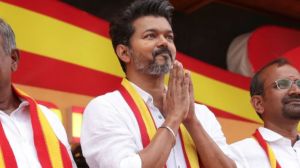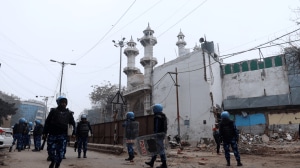Arrest order for Prabhakaran as Lanka bans LTTE
COLOMBO, Jan 27: The Colombo High Court has issued an arrest warrant for Velupillai Prabhakaran, leader of the Liberation Tigers of Tamil Ee...

COLOMBO, Jan 27: The Colombo High Court has issued an arrest warrant for Velupillai Prabhakaran, leader of the Liberation Tigers of Tamil Eelam, for the bombing of the central bank in January, 1996. Issuing the warrant on Monday, Justice A N Ramachandra ordered the police to produce Prabhakaran before the court on February 26 before the commencement of the trial.
The court also issued warrants for eight of the ten other LTTE members accused in the case. Two of them were arrested soon after the bombing which killed nearly 89 people and injured at least 1,000 others.
The arrest warrants for Prabhakaran and his aides were issued in the wake of a ban imposed on Monday by the Sri Lankan Government on the LTTE, which has been waging a war for an independent Tamil homeland in the north-east of the country.
A one-line announcement proscribing the group was made late on Monday night over Rupavahini, the State-run television in Sinhala, Tamil and English. It came a day after a LTTE suicide squad detonated a truckbomb at the Dalida Maligawa, Sri Lanka8217;s holiest Buddhist shrine, in Kandy.
There was no immediate reaction from the LTTE, which maintains an office in London. Despite a long-standing demand in Sri Lanka for the banning of the Tamil Tigers, the government had earlier refused to take this step, stating that this could shut the group out of possible peace talks. The sudden move to proscribe the Tigers is being interpreted as an attempt to blunt widespread criticism for the government8217;s failure to curb the group, especially in the light of Sunday8217;s attack on the temple of the Tooth Relic, which has wounded the sensibilities of the majority Sinhalese-Buddhist community. Earlier on Monday, Buddhist monks marched in a huge procession towards Temple Trees, the official home of President Chandrika Kumaratunga, demanding her resignation for her failure to protect the shrine, which houses a tooth said to belong to Buddha.
Sri Lanka8217;s main opposition party, the United National Party, which has said that talking tothe LTTE is the only way out of the conflict raging in the country criticised the move as an 8220;attempt to divert the attention of the people8221; from its failures. 8220;But the people will not be fooled by this.
Even if there is a ban, the LTTE will keep fighting, and in order to combat this, the government must have a strategy, which it does not,8221; said party leader Ranil Wickremsinghe, who last year signed a British-sponsored agreement with the government on peace talks with the Tigers. Tamil politicians who are of the view that talking to the LTTE is the only way out of the ethnic conflict, fear that the govt decision may adverse affect chances for peace in Sri Lanka.
8220;This may mean the government does not want to talk to the LTTE, because the reason given by them earlier for not banning the group was that it did not want to close the door on negotiations,8221; said M Sivasithamaparam of the moderate Tamil United Liberation Front, which has been demanding negotiations with the Tigers.
- 01
- 02
- 03
- 04
- 05































